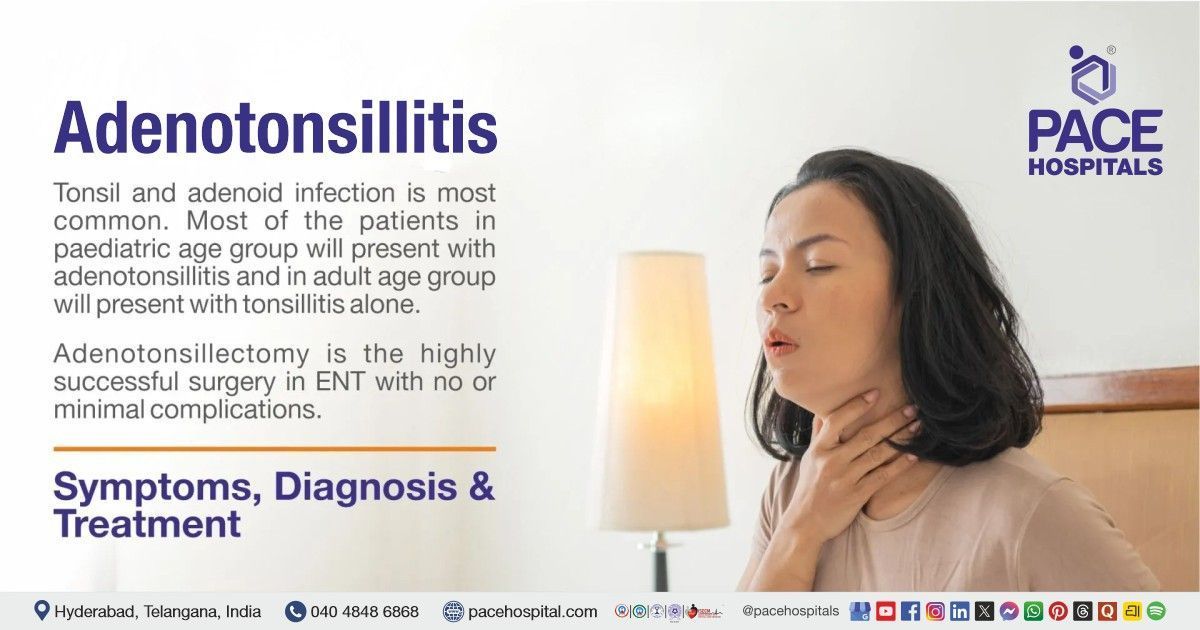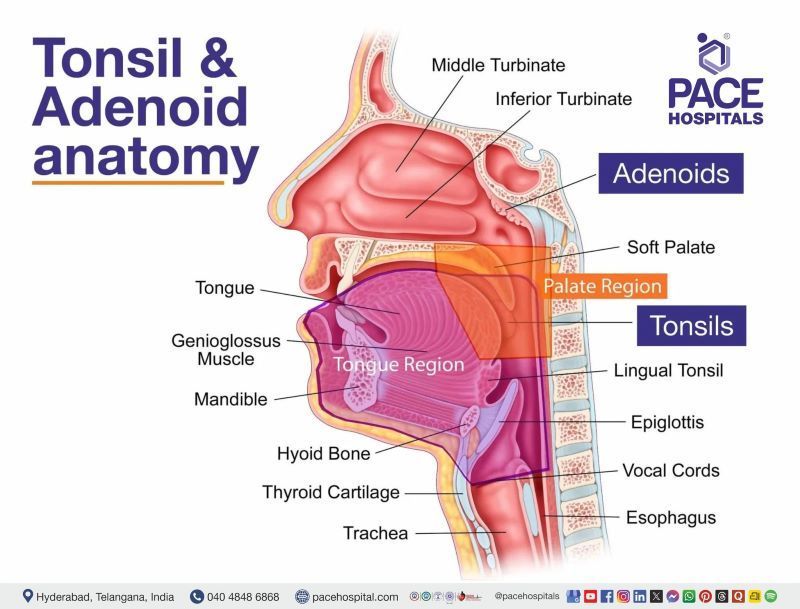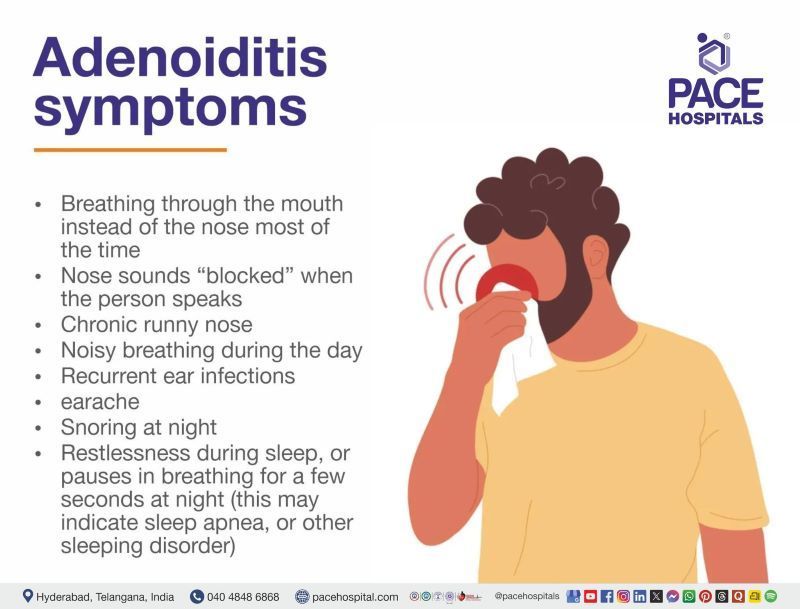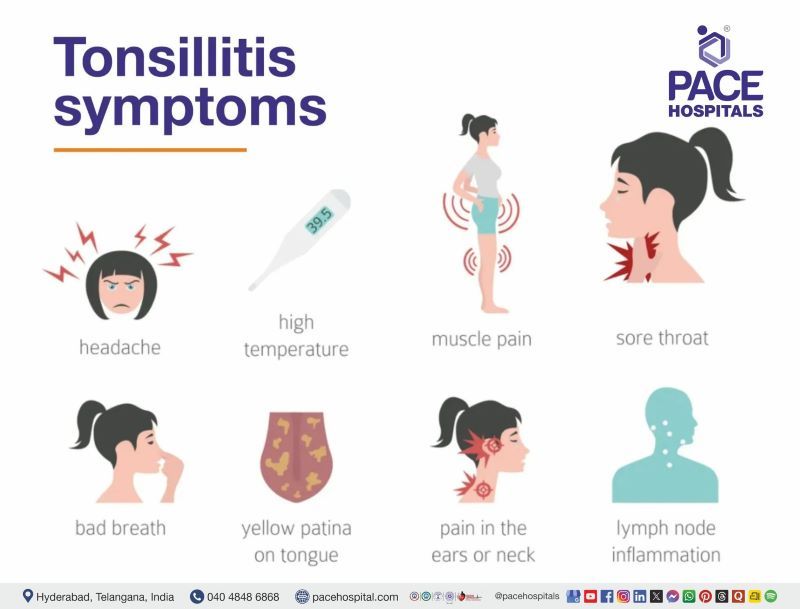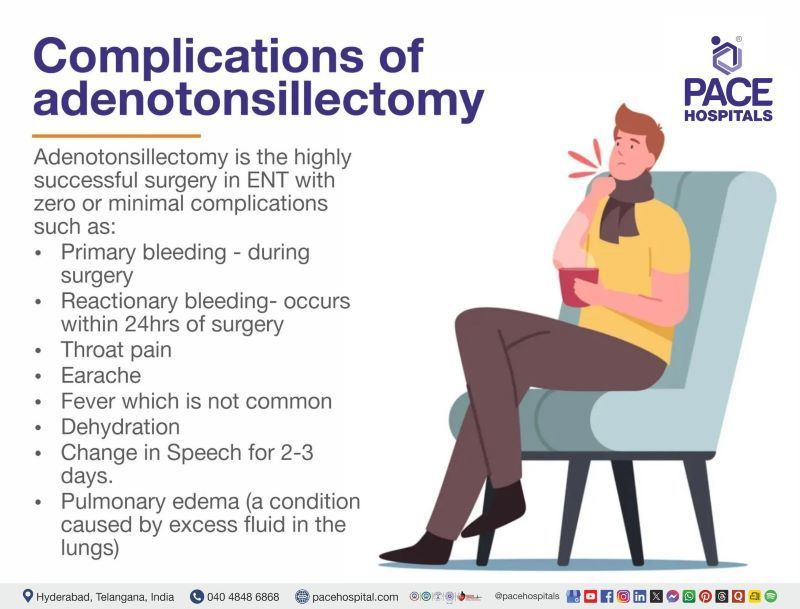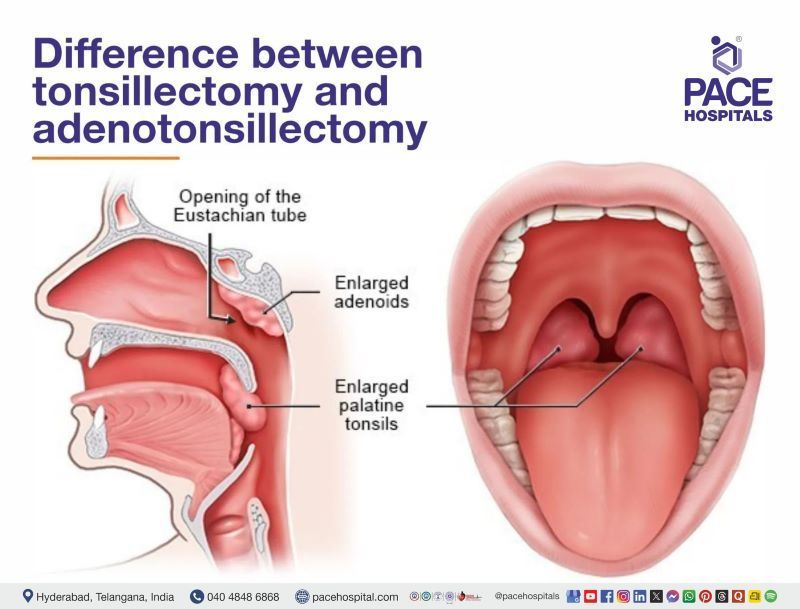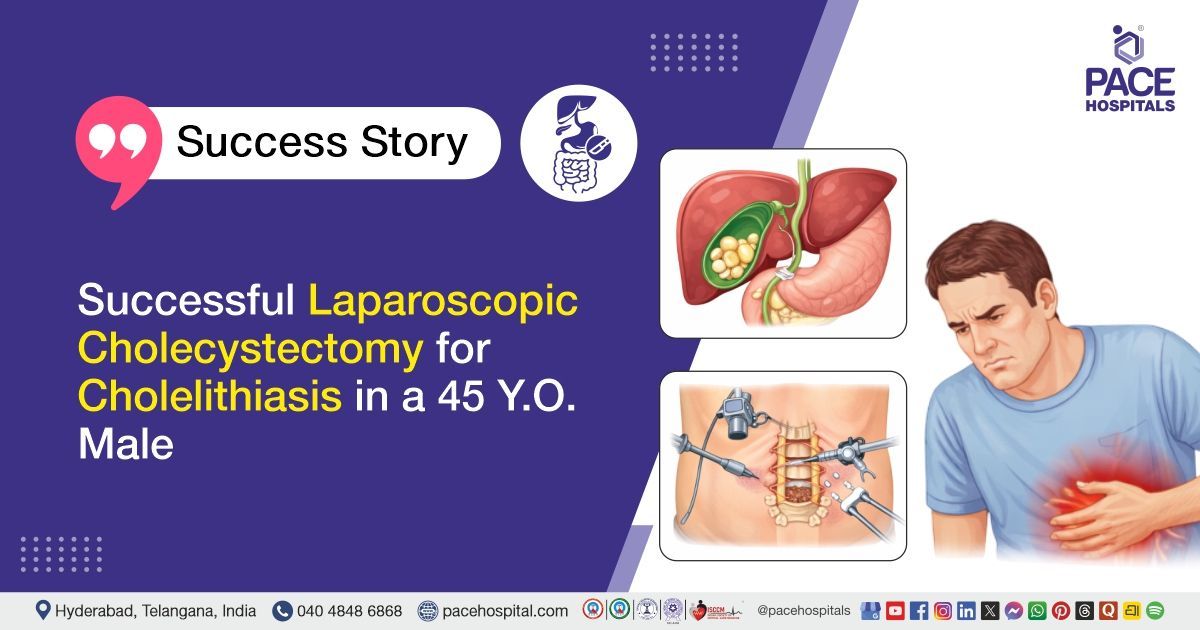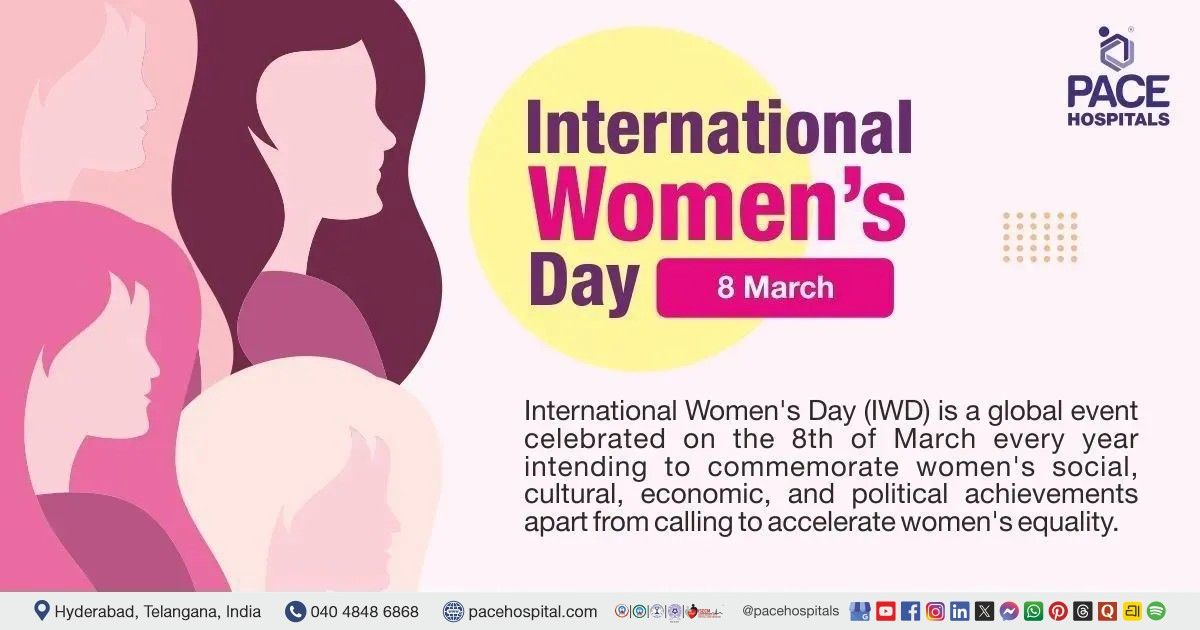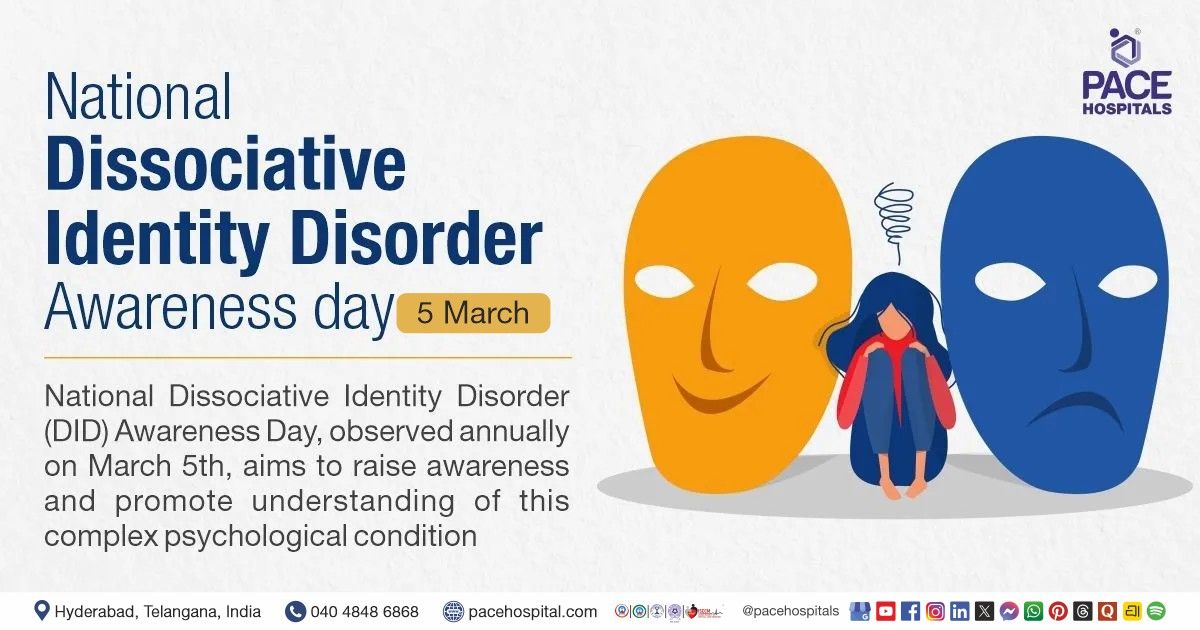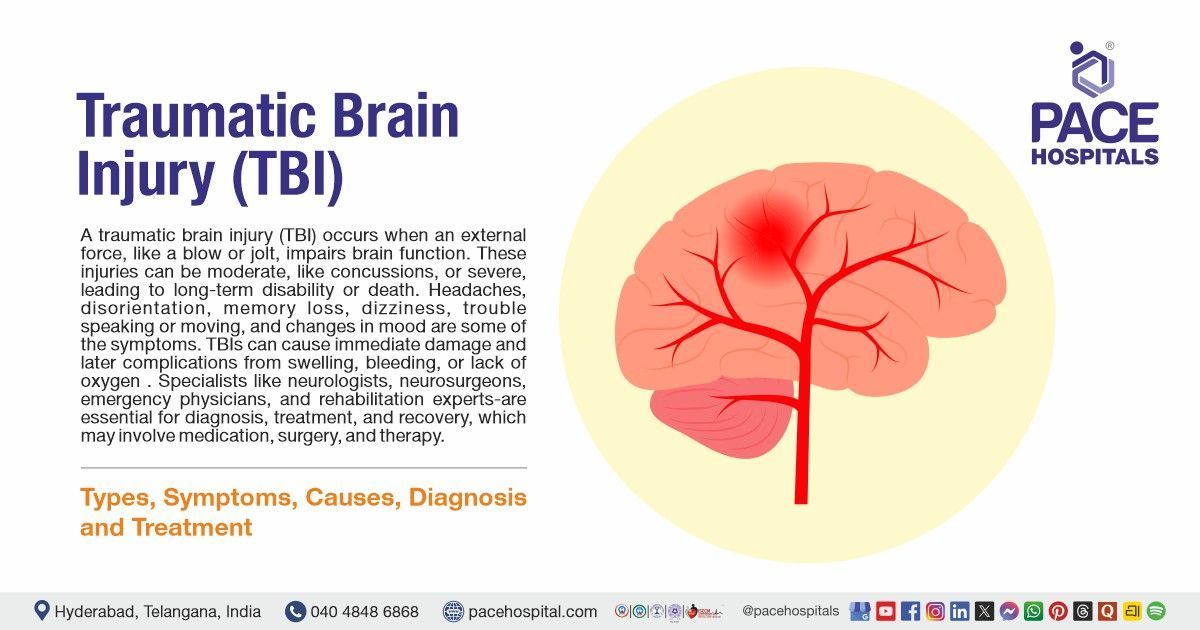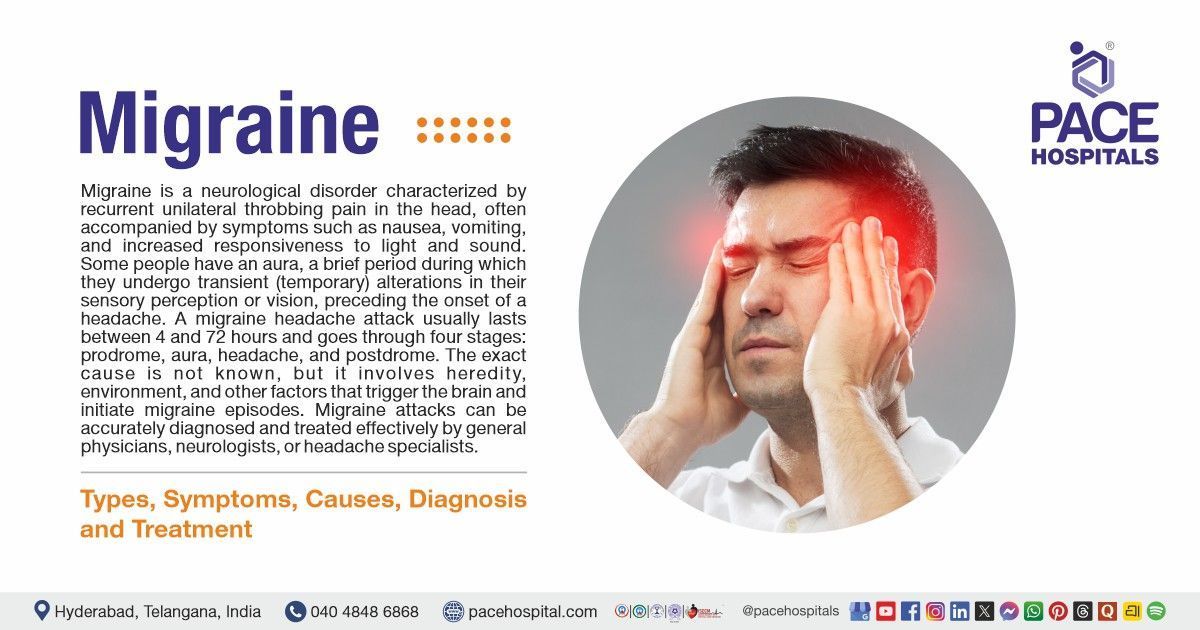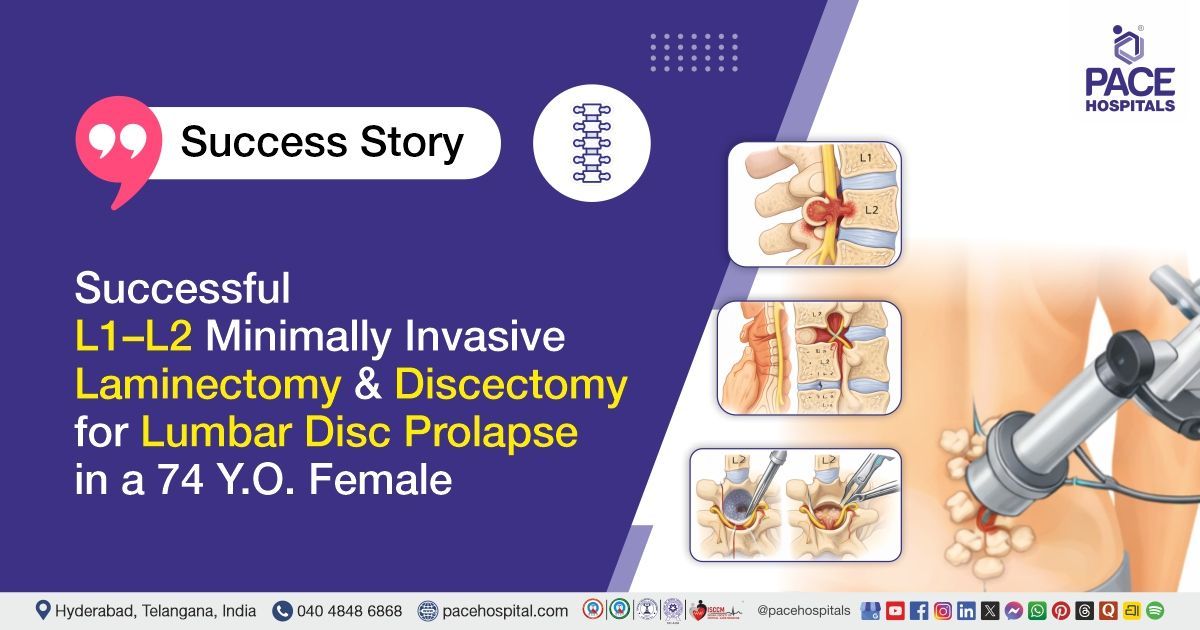Adenotonsillitis - Symptoms, Diagnosis and Treatment
PACE Hospitals
Tonsils are the two round lumps in the back of your throat. Adenoids are high in the throat, behind the nose and the roof of the mouth (referred to as your soft palate). They are not visible through the mouth or nose without special instruments.
Tonsils and adenoids are part of the immune system and help protect the body from disease. They “sample” bacteria and viruses that enter through the mouth or nose. Unfortunately, sometimes they can get infected or cause problems by being too large.
Tonsil and adenoid infection is most common. The infection of tonsils and adenoids occur at age of 3-6 years. The reason for this is the child starts going to nursery or school and starts meeting and playing with other children. So, the child will develop respiratory infections most frequently.
Usually in 90 % of children, adenoids shrink their size after 12 years of age. So, the problem with adenoids after 12 years of age is very rare.
But in contrast, Tonsils remain in the throat lifelong with minimal shrinkage when compared to adenoids. So, this results in infection to your tonsils at any age of your life.
Adenotonsillitis is managed and treated by an ENT specialist (Ear, Nose, and Throat doctor), also known as an otorhinolaryngologist.
- Medical treatment (medications, monitoring, and follow-up) is handled by an ENT specialist, often in coordination with a pediatrician for children.
- Surgical treatment, when required (adenotonsillectomy or adenoidectomy), is performed by an ENT surgeon, typically with experience in pediatric ENT care.
Types of Adenotonsillitis
Adenotonsillitis is classified based on the pattern, duration, and clinical course of inflammation involving the adenoids and tonsils. Accordingly, adenotonsillitis is broadly grouped into the following clinical types:
- Acute Adenotonsillitis
- Recurrent Adenotonsillitis
- Chronic Adenotonsillitis
- Obstructive Adenotonsillitis
- Complicated Adenotonsillitis
Acute Adenotonsillitis: This type refers to a sudden episode of inflammation affecting the adenoids and tonsils, most commonly found in children aged 5 to 10 years of age and young adults 15 to 25 years of age. It is usually short-lived and resolves with proper medical care. Acute episodes are frequently isolated and do not always signal a chronic illness.
Recurrent Adenotonsillitis: It is defined by multiple distinct episodes over time, with periods of recovery in between. Repeated inflammation may affect daily functioning and is often considered when evaluating the need for long-term treatment strategies.
Chronic Adenotonsillitis: It is associated with persistent inflammation lasting for several weeks or longer. In this form, the adenoids and tonsils remain enlarged or inflamed despite standard treatment, often prompting further evaluation for definitive management.
Obstructive Adenotonsillitis: In obstructive adenotonsillitis, enlargement of the adenoids and tonsils leads to mechanical airway obstruction, rather than repeated infections. This type is commonly considered in treatment planning when airway patency is affected.
Complicated Adenotonsillitis: This type includes cases where inflammation of the adenoids and tonsils is associated with local or regional complications. Such cases usually require closer monitoring and may influence the choice between continued medical care and surgical intervention.
What are the symptoms of adenoiditis?
Based on symptoms, it can be termed as cold or strep throat adenoiditis. Symptoms of adenoiditis include:
- Breathing through the mouth instead of the nose, most of the time
- Nose sounds “blocked” when the person speaks
- Chronic runny nose
- Noisy breathing during the day
- Recurrent ear infections
- Earache
- Snoring at night
- Restlessness during sleep, or pauses in breathing for a few seconds at night (this may indicate sleep apnea, or other sleeping disorder)
What are the symptoms of tonsillitis?
Infection to tonsils is known as tonsillitis.
- Sore throat
- Enlarged tonsils obstructing the oral route
- Exudates or pus on the tonsil
- Pain swallowing
- Fever
- Jugulo digastric nodes swelling
- Obstructive sleep apnoea
- Snoring
There are some conditions in which one tonsil is enlarged and abscess formation in the tonsil known as peritonsillar abscess
Most of the patients in paediatric age group will present with adenotonsillitis, Most of the patients in adult age group will present with tonsillitis alone.
Complications of Adenotonsillectomy
Adenotonsillectomy is the highly successful surgery in ENT with zero or minimal complications such as:
- Primary bleeding - during surgery
- Reactionary bleeding- occurs within 24hrs of surgery
- Throat pain
- Earache
- Fever which is not common
- Dehydration
- Change in Speech for 2-3 days.
- Pulmonary edema (a condition caused by excess fluid in the lungs)
Adenotonsillitis Diagnosis
For tonsillitis, we can diagnose the extent of tonsillar infection with direct throat examination.
- We can see pus or exudates over the tonsil, which indicates active infection.
- Enlarged tonsils
Based on size of the tonsils and level of obstruction if oral route, we can do grading of tonsillar swelling.
For adenoids, as they are situated backside of the nose, they are not visible on direct examination.
We have to do x-ray nasopharynx or diagnostic paediatric nasal endoscopy for the diagnosis. So, we can see adenoid mass in the back of the nose obstructing the nasal route.
Management of Adenotonsillitis
The symptoms of Aden tonsillitis have recurrence. If the recurrence of symptoms twice or thrice in a year we can treat with antibiotics and antihistamines, decongestant nasal drops and anti-allergic nasal sprays.
If the recurrence of symptoms is 5 times or more than 5 times in a year that is recurrence of symptoms for every 2-3 months in a year surgery is indicated.
Adenotonsillitis Treatment
The surgery for tonsil or tonsillectomy is a day care procedure, means it can be admission to discharge can be done in a single day.
Adenotonsillectomy can be performed in many ways. The surgery will be performed under general anaesthesia while you are sleeping. The surgery usually takes 20 to 30 minutes. You will not feel any pain while the doctor is removing the tonsils. All the tonsils are usually removed, but some patients may benefit from a partial tonsillectomy.
A surgeon will use the technique that is best for the particular patient. The most common ways to take tonsils out include:
- Electrocautery: This method uses heat to remove the tonsils and stop any bleeding.
- Cold knife (steel) dissection: The tonsils are removed with a scalpel. Bleeding is then stopped with sutures or with electrocautery (extreme heat).
- Harmonic scalpel: This method uses ultrasonic vibrations to cut and stop bleeding from the tonsils at the same time.
- Other methods include the use of radiofrequency ablation techniques, a carbon dioxide laser, and/or a microdebrider.
Based on your symptoms and grading of tonsils, the surgeon can decide which technique suits you best.
Why Choose PACE Hospitals?
Expert Super Specialist Doctors
Advanced Diagnostics & Treatment
Affordable & Transparent Care
24x7 Emergency & ICU Support
Difference between tonsillectomy and adenotonsillectomy
Tonsils are situated in the back side of our throat. Enlargement of tonsils results in oral route obstruction. So, TONSILLECTOMY refers to removal of infected tonsils from our oral cavity.
Adenoids are situated at the back side of our nose. Enlargement of adenoids results in nasal blockage mainly. So, ADENOIDECTOMY refers to removal of infected adenoids from nasopharynx.
ADENOTONSILLECTOMY refers to combined removal of infected adenoids along with infected tonsils. Usually in children when there is an infection or enlargement of tonsils, we can suspect enlargement of adenoids as well. As the adenoids are situated just above the tonsils. So, adenotonsillectomy is performed as a combined procedure to relive the obstruction caused by enlargement of the tissue.
Myth: Removing tonsils will decrease immunity
There is one common myth that removing tonsils will decrease immunity. Tonsils and adenoids help in immunity until they get infected. Once they are infected they act as reservoirs for bacteria and viruses.
What is the tonsillectomy surgery cost in India?
The cost of Tonsil surgery / Tonsillectomy surgery in India is approx Rs. 15,000 to Rs. 60,000, and it depends upon the region and equipment used.
The cost of Tonsil surgery / Tonsillectomy surgery in Hyderabad is approx Rs. 25,000 to Rs. 50,000.
What is the adenoidectomy / adenotonsillectomy surgery cost in India?
The cost of adenoidectomy / adenotonsillectomy surgery in India is approx Rs. 20,000 to Rs. 70,000 and it depends upon the region and equipment used.
The cost of adenoidectomy / adenotonsillectomy surgery in Hyderabad is approx Rs. 25,000 to Rs. 60,000.
Frequently Asked Questions (FAQs) on Adenotonsillitis
What are the first signs of adenoid problems?
The first signs of adenoid problems include breathing issues (persistent mouth breathing), chronic nasal congestion, loud snoring, and recurrent ear infections. Even if no evident cold is present, parents may observe chronic mouth breathing, noisy breathing at night, or frequent blocked-nose complaints with constant runny nose (yellow/green mucus), and bad breath. Some children experience recurring ear problems such as fluid accumulation in the middle ear, and frequent sore throats, because larger adenoids impair normal middle-ear airflow.
What causes adenoid inflammation?
Adenoid inflammation is most usually caused by upper airway infections, but it can also be caused by allergies or throat irritation from stomach acid reflux. Many children's inflammation is not isolated and may coexist with tonsil or sinus inflammation. Repeated inflammation may lead to adenoid tissue to develop over time.
What is the difference between tonsillitis and adenoiditis?
Tonsillitis refers to inflammation of the palatine tonsils (seen at the back of the throat), while adenoiditis involves the adenoids (located higher behind the nose). Because adenoids are placed in the nasopharynx behind the nose and are unseen during a typical, direct-view throat exam, they are commonly diagnosed based on symptomatic nasal obstruction rather than direct visibility. Both can occur together, which is why adenotonsillar disease is commonly discussed as a combined condition.
What is the best age to remove tonsils and adenoids?
There isn't one "best" age for everyone—surgery is usually considered when clear medical indications exist. According to evidence summaries, adenoidectomy has a clearer benefit in certain conditions as children age (typically beyond the early toddler years), although judgments for sleep-related blockage or recurrent infections are more customized. Before considering surgery, an ENT (Ear, Nose and Throat) specialist normally considers the patient's age, severity, and overall condition.
Can adenoids be removed without surgery?
No, removal is a surgical operation. Many children, however, may not require removal since the underlying causes (infection, allergy, and reflux-related discomfort) can be managed and monitored properly. Surgery is usually reserved for persistent obstruction, significant functional impairment, or specific recurring disorders that do not respond to conservative treatment.
What does an adenoid face look like?
"Adenoid facies" is a descriptive term used when long-term mouth breathing affects facial posture and growth patterns. It may include an open-mouth resting posture and changes in oral–facial muscle positioning over time. The look is not a diagnostic label in and of itself, but it can indicate persistent nasal blockage and demands further study.
What is the recovery time for adenoidectomy (adenotonsillectomy)?
Recovery time is typically shorter than for many other surgical procedures, however this varies depending on the child and if tonsil surgery is performed concurrently or separately. Many youngsters resume regular activities after 1-2 weeks, with progressive improvements in eating, sleeping, and comfort.
Are adenoids a serious problem?
Adenoids themselves are normal immune tissue in childhood, and mild enlargement is common. Concerns emerge when they become chronically swollen or inflamed, interfering with breathing, sleep quality, and ear health. The severity is evaluated by the degree of obstruction and the impact on daily functioning and development.
What foods should a person avoid with adenoids?
There is no universal "adenoid diet," but foods that irritate the throat or worsen reflux can make upper-airway inflammation harder to settle in some children. Very spicy, highly acidic, and fried foods may aggravate irritation in reflux-prone individuals. When reflux is considered as a contributing factor, dietary changes are frequently recommended as part of the overall treatment plan.
At what age do adenoids start causing problems?
Adenoids are present early in life and typically enlarge through childhood, with a common peak in school-age years. They often shrink during puberty and may become very small by adulthood. In younger children, the upper airway is relatively narrow, thus even slight expansion might create apparent obstruction.
What are symptoms of needing adenoids removed?
Adenoid removal is usually considered when symptoms are persistent, functionally significant, and clearly linked to enlarged or chronically inflamed adenoids. Common reasons include ongoing nasal obstruction affecting breathing and sleep (having problems like snoring, and obstructive sleep apnea), or recurrent issues linked to upper airway obstruction. A specialist confirms the cause and rules out other contributors before recommending surgery.
When is it too late to remove adenoids?
It is rarely "too late," but the reason for surgery changes with age. Since adenoids often shrink naturally during adolescence, adults are less likely to need adenoidectomy unless symptoms are persistent and clearly linked to adenoid tissue. The decision is based on current findings after and impact—not simply age.
When to worry about adenoids?
Concerns are justified when breathing or sleep are routinely disrupted, or when recurrent ENT difficulties continues despite proper medical treatment. In some children, ongoing blockage can affect sleep quality, daytime behavior, and ear health. An ENT examination can help determine whether the adenoids are the primary reason or whether there are other factors at play.
Can adenoids cause speech delay?
Enlarged adenoids may contribute indirectly by affecting airflow and resonance, as well as, in some circumstances, encouraging middle-ear fluid and hearing alterations that impact speech and language development. Not every child with large adenoids has speech problems, but persistent concerns should be addressed early on. When necessary, evaluations may include both an ENT assessment and hearing tests.
Share on
Request an appointment
Fill in the appointment form or call us instantly to book a confirmed appointment with our super specialist at 04048486868

